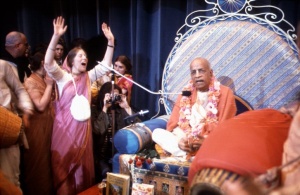CC Adi 2.65: Difference between revisions
m (1 revision(s)) |
(Vanibot #0054 edit - transform synonyms into clickable links, which search similar occurrences) |
||
| (One intermediate revision by one other user not shown) | |||
| Line 1: | Line 1: | ||
{{ | [[Category:Sri Caitanya-caritamrta - Adi-lila Chapter 02|C065]] | ||
<div style="float:left">'''[[Sri Caitanya-caritamrta|Śrī Caitanya-caritāmṛta]] - [[CC Adi|Ādi-līlā]] - [[CC Adi 2|Chapter 2: Śrī Caitanya Mahāprabhu Is the Supreme Personality of Godhead]]'''</div> | |||
<div style="float:right">[[File:Go-previous.png|link=CC Adi 2.64|Ādi-līlā 2.64]] '''[[CC Adi 2.64|Ādi-līlā 2.64]] - [[CC Adi 2.66|Ādi-līlā 2.66]]''' [[File:Go-next.png|link=CC Adi 2.66|Ādi-līlā 2.66]]</div> | |||
{{CompareVersions|CC|Adi 2.65|CC 1975|CC 1996}} | |||
{{RandomImage}} | |||
==== TEXT 65 ==== | ==== TEXT 65 ==== | ||
<div | <div class="verse"> | ||
advaya-jñāna tattva-vastu kṛṣṇera svarūpa | :advaya-jñāna tattva-vastu kṛṣṇera svarūpa | ||
brahma, ātmā, bhagavān—tina tāṅra rūpa | :brahma, ātmā, bhagavān—tina tāṅra rūpa | ||
</div> | </div> | ||
| Line 12: | Line 16: | ||
==== SYNONYMS ==== | ==== SYNONYMS ==== | ||
<div | <div class="synonyms"> | ||
advaya- | ''[//vanipedia.org/wiki/Special:VaniSearch?s=advaya&tab=syno_o&ds=1 advaya]-[//vanipedia.org/wiki/Special:VaniSearch?s=jñāna&tab=syno_o&ds=1 jñāna]'' — knowledge without duality; ''[//vanipedia.org/wiki/Special:VaniSearch?s=tattva&tab=syno_o&ds=1 tattva]-[//vanipedia.org/wiki/Special:VaniSearch?s=vastu&tab=syno_o&ds=1 vastu]'' — the Absolute Truth; ''[//vanipedia.org/wiki/Special:VaniSearch?s=kṛṣṇera&tab=syno_o&ds=1 kṛṣṇera]'' — of Lord Kṛṣṇa; ''[//vanipedia.org/wiki/Special:VaniSearch?s=sva&tab=syno_o&ds=1 sva]-[//vanipedia.org/wiki/Special:VaniSearch?s=rūpa&tab=syno_o&ds=1 rūpa]'' — own nature; ''[//vanipedia.org/wiki/Special:VaniSearch?s=brahma&tab=syno_o&ds=1 brahma]'' — Brahman; ''[//vanipedia.org/wiki/Special:VaniSearch?s=ātmā&tab=syno_o&ds=1 ātmā]'' — Paramātmā; ''[//vanipedia.org/wiki/Special:VaniSearch?s=bhagavān&tab=syno_o&ds=1 bhagavān]'' — the Supreme Personality of Godhead; ''[//vanipedia.org/wiki/Special:VaniSearch?s=tina&tab=syno_o&ds=1 tina]'' — three; ''[//vanipedia.org/wiki/Special:VaniSearch?s=tāṅra&tab=syno_o&ds=1 tāṅra]'' — of Him; ''[//vanipedia.org/wiki/Special:VaniSearch?s=rūpa&tab=syno_o&ds=1 rūpa]'' — forms. | ||
</div> | </div> | ||
| Line 19: | Line 23: | ||
==== TRANSLATION ==== | ==== TRANSLATION ==== | ||
<div | <div class="translation"> | ||
Lord Kṛṣṇa Himself is the one undivided Absolute Truth, the ultimate reality. He manifests Himself in three features—as Brahman, Paramātmā and Bhagavān. | Lord Kṛṣṇa Himself is the one undivided Absolute Truth, the ultimate reality. He manifests Himself in three features—as Brahman, Paramātmā and Bhagavān. | ||
</div> | </div> | ||
| Line 26: | Line 30: | ||
==== PURPORT ==== | ==== PURPORT ==== | ||
<div | <div class="purport"> | ||
In the verse from Śrīmad-Bhāgavatam cited above ([[SB 1.2.11]]), the principal word, bhagavān, indicates the Personality of Godhead, and Brahman and Paramātmā are concomitants deduced from the Absolute Personality, as a government and its ministers are deductions from the supreme executive head. In other words, the principal truth is exhibited in three different phases. The Absolute Truth, the Personality of Godhead Śrī Kṛṣṇa (Bhagavān), is also known as Brahman and Paramātmā, although all these features are identical. | In the verse from ''Śrīmad-Bhāgavatam'' cited above ([[SB 1.2.11]]), the principal word, ''bhagavān'', indicates the Personality of Godhead, and Brahman and Paramātmā are concomitants deduced from the Absolute Personality, as a government and its ministers are deductions from the supreme executive head. In other words, the principal truth is exhibited in three different phases. The Absolute Truth, the Personality of Godhead Śrī Kṛṣṇa (Bhagavān), is also known as Brahman and Paramātmā, although all these features are identical. | ||
</div> | </div> | ||
__NOTOC__ | |||
<div style="float:right; clear:both;">[[File:Go-previous.png|link=CC Adi 2.64|Ādi-līlā 2.64]] '''[[CC Adi 2.64|Ādi-līlā 2.64]] - [[CC Adi 2.66|Ādi-līlā 2.66]]''' [[File:Go-next.png|link=CC Adi 2.66|Ādi-līlā 2.66]]</div> | |||
__NOTOC__ | |||
__NOEDITSECTION__ | |||
Latest revision as of 18:48, 19 February 2024

A.C. Bhaktivedanta Swami Prabhupada
TEXT 65
- advaya-jñāna tattva-vastu kṛṣṇera svarūpa
- brahma, ātmā, bhagavān—tina tāṅra rūpa
SYNONYMS
advaya-jñāna — knowledge without duality; tattva-vastu — the Absolute Truth; kṛṣṇera — of Lord Kṛṣṇa; sva-rūpa — own nature; brahma — Brahman; ātmā — Paramātmā; bhagavān — the Supreme Personality of Godhead; tina — three; tāṅra — of Him; rūpa — forms.
TRANSLATION
Lord Kṛṣṇa Himself is the one undivided Absolute Truth, the ultimate reality. He manifests Himself in three features—as Brahman, Paramātmā and Bhagavān.
PURPORT
In the verse from Śrīmad-Bhāgavatam cited above (SB 1.2.11), the principal word, bhagavān, indicates the Personality of Godhead, and Brahman and Paramātmā are concomitants deduced from the Absolute Personality, as a government and its ministers are deductions from the supreme executive head. In other words, the principal truth is exhibited in three different phases. The Absolute Truth, the Personality of Godhead Śrī Kṛṣṇa (Bhagavān), is also known as Brahman and Paramātmā, although all these features are identical.